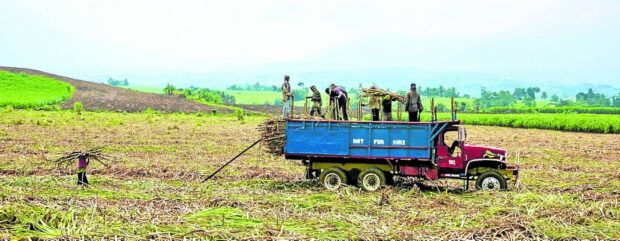
HARVEST Sugar farmworkers harvest cane in Negros Occidental early this year. This province in Western Visayas region is a leading sugarcane producer in the country. —PHOTO COURTESY OF RONNIE BALDONADO
BACOLOD CITY — Sugar industry stakeholders have called on President Marcos to deny Finance Secretary Benjamin Diokno’s plan to liberalize sugar importation, saying it will destabilize the livelihood of thousands of marginal sugarcane farmers.
Danilo Ramos, chair of the Kilusang Magbubukid ng Pilipinas, opposed the proposal of Diokno to further liberalize the domestic sugar industry, saying allowing for more imports will not lower or taper current high prices nor cushion the impact of taxes on sugary beverages.
READ: Tax on junk food, higher soft drink levy pushed
“Liberalization will be the final nail in the coffin of the country’s ailing sugar industry,” he said on Tuesday, June 27.
The peasant group said the majority of sugar farmers and workers in the sugar industry stand to suffer the same plight of rice farmers affected by rice tariffication once full liberalization of the sugar industry takes effect.
Most of the country’s sugar mills and refineries are in Negros.
Leaders of the country’s groups of sugar producers have also opposed Diokno’s move. They were Manuel Lamata, president of the United Sugar Producers Federation of the Philippines (Unifed); Enrique Rojas, president of the National Federation of Sugarcane Planters; and Aurelio Valderrama Jr., president of the Confederation of Sugar Producers’ Associations (Confed).
Effect on 5M Filipinos
Unifed had appealed to President Marcos to ignore calls of Diokno to allow industrial users to directly import their sugar needs as a concession to plans of increasing taxes on sugar-sweetened beverages.
Lamata said they are totally against the move of Diokno to liberalize importation in favor of a few industrial users.
“He (Diokno) wants to further enrich these industrial users even knowing that this move will kill the more than 5 million Filipinos who are dependent on the sugar industry,” he said.
“Diokno is bent only on raising taxes without thinking of its effects on the sugar farmers. The finance secretary is ill-advised. Diokno should also think of the consumers or the general public who will also be affected as these industrial users will surely pass on the additional taxes to their consumers,” he added.
Unifed hoped the President would not endorse this plan that, it said, was never even done in consultation with the sugar industry.
Uphold regulations
“We know President Marcos’ heart is with and for the farmers as he has told us so, and we are calling for his intervention on this matter. Diokno is clearly antifarmer,” Lamata said.
Rojas, for his part, said allowing manufacturers of sweetened beverages to directly import sugar would wreak havoc on the long-established government regulations over the sugar industry, and it will further destabilize the livelihood of thousands of marginal sugarcane farmers.
He noted that in 2016 and 2017, when beverage manufacturers freely imported high-fructose corn sugar as sweetener for their products, it caused the drastic drop in sugar prices to almost below production level, and numerous farmers suffered losses.
“Worse, the use of cheaper imported sweetener input by these manufacturers simply fattened their pockets more, but it did not translate to lower prices of soft drink products for consumers,” Rojas said.
Valderrama said Confed would also oppose the move to allow industrial users to directly import their sugar needs and the proposed additional tax on sugar-sweetened beverages.
READ: Direct sugar importation of beverage makers bucked